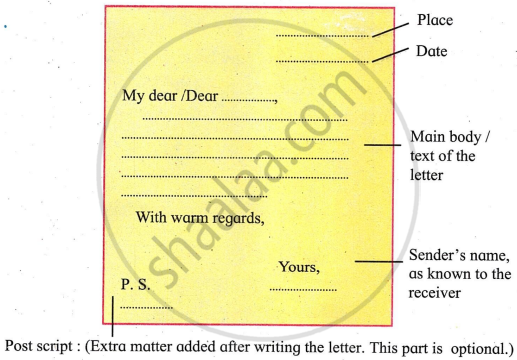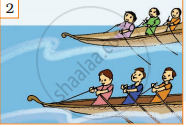Advertisements
Advertisements
Question
Write points and counterpoints on the following topic:
You should study all subjects in your mother tongue
Solution
- Points:
- Language is a sign that symbolises one's community's culture and ethnic identity, and speaking in one's home tongue can help pupils all over the world develop a sense of self.
- If students do not understand English instructions, they may lose confidence and choose to sit silently or repeat them mechanically. This can lead to frustration, failure, and dropout.
- Counterpoints:
- India is a country having 60 languages, some of which are state-specific, and Hindi is the national language. English, an international language, has now become a language that connects all of India. On the other side, we have our mother tongues, which teach children about our culture and history.
- If instructions are given in the mother tongue, how will kids adapt to English later on? Educationists and policymakers should think about it.
APPEARS IN
RELATED QUESTIONS
Your school is hosting an Inter-School Quiz Competition.
Write out a notice to be displayed in your school, giving all the details about the event.
In the following items, sentence A is complete, while sentence B is not. Complete sentence B, making it as similar as possible to sentence A. Write sentence B.
(A) As soon as the bell rings, the children run out to play.
(B) No sooner __________________________________.
What do you think of the old man’s point of view?
The caged bird sings with
A fearful trill of things unknown
But longed for still and his
Tune is heard on the distant hill
For the caged bird sings of freedom.
Read the above lines and answer the question that follow.
Explain with reference to the context.
How has Browning used allusion in the poem? Explain.
Who was talking to the old man?
What is the theme of all summer in a day by Ray Bradbury?
Write a composition (350–400 words) on the following:
You had booked a ticket on an early morning train. However, you woke up late and missed it. You then decided to run to catch a bus to the next station, where you hoped to catch up with the train. Narrate the entire event, including how you felt, the effort you made, and how you finally caught the train. What did you learn from this stressful experience?
Given below is an interesting combination of words. Explain why they have been used together.
scientific detachment
Words with the sound ‘ch’ as in ‘chart’ and ‘tr’ as in ‘trembles’ in the poem.
Now write a paragraph or two about these two stories, comparing them.
Look at these sentences.
|
|
| ‘Would’ tells us what the author used to do, or what used to happen. | ‘Could’ tells us what the author was usually able to do, or grandfather is now not able to do. |
Choose would and could to replace the italicised words in the following sentences.
Choose would and could to replace the italicised words in the following sentences.
Grandfather says, in the old days,
1. elephants were able to fly in the sky, like clouds. They were also able to change their shapes. They used to fly behind clouds and frighten them. People used to look up at the sky in wonder.
2. because there was no electricity, he used to get up with the sun, and he used to go to bed with the sun, like the birds.
3. like the owl, he was able to see quite well in the dark. He was able to tell who was coming by listening to their footsteps.
Frame a pointwise Analysis of the poem ‘The worm’. Use the following points.
- Poem and poet:
- Theme:
- Tone:
- Structure and stanzas:
- Rhyme and Rhythm:
- Language and Imagery:
- Figures of Speech:
Discuss with your partner and match the following expressions given in column A with their interpretations in column 'B'.
| Sr.No. | A | B |
| 1. | While Chief Baron Ear sat to balance the laws. | (a) Eyes are refrained from using spectacles. |
| 2. | They are made with the straddle as wide as the ridge of the Nose is. | (b) The responsibility of giving a verdict rested on the shoulders of the hearing organ. |
| 3. | That whenever the Nose put his Spectacles on, by daylight or candlelight Eyes should be shut! | (c) Spectacles are meant for none other than the nose. |
| 4. | So his lordship decreed with a grave solemn tone, decisive and clear, without one if or but. | (d) The judge delivered a firm verdict without any doubt. |
Place the given areas of questioning from the list in the appropriate columns.
- future plans
- inspiration
- overcoming hurdles/ struggle
- coach/ mentor/ guide/ teacher
- message for the youngsters
- family support
- alternate career choice
- first or maiden award/ achievement /success /setbacks
- a turning point in life/ success formula/technique.
| Section of the interview | Aspects to be covered | |
| 1. | Introduction | Welcoming/Greeting, Introduction of the guest/Occasion. |
| 2. | Opening questions | |
| 3. | Main body | |
| 4. | Concluding questions | |
| 5. | Summing up | Concluding the statement, Expressing gratitude. |
You can add your points.
Write down the consequences of the following occurrences with the help of the play.
Dr. Thomas Stockmann wants an article exposing social evils to be printed in the newspaper.
Form pairs. Discuss how ‘Part II’ of the story could have been different. Write your storyline in the form of bullets showing the main events.
Discuss the following and write about the following in your own words in 5-6 lines.
Which events in the story (Part I and Part II) changed Mathilde’s life?
Study the following format of an informal letter carefully. Using the format,

Write an informal letter to your friend who has gone to another town for a month.
Prepare a set of questions to interview-
a person who has just returned from a trek in the woods
Look at the image of the familiar advertisement given below. Identify the product and try to frame your own slogan.

The Pooja holidays are about to start. Prasanth and Deepak are friends. Both their families have planned to go on a trip to Munnar. Develop a conversation on how they plan for their trip.
|
Plan:
|
Fill in the blank by choosing the preposition from the option.
The boy ran ______ the dog.
Now complete the following suitably.
I was sitting in a taxi yesterday when _________
Answer the question by looking at the picture.
Example: What is happening in picture 5?

Why did they sympathize with the first patient?
What are the essentials one needs to lead a comfortable life? Fill in the empty bubbles with some of them

Read the given sentence and underline the no word.
None of the two boys came.
The line 'The house-roofs seemed to heave and sway' in Browning's poem 'The Patriot' means ______.
Find some examples of antithesis from your mother tongue and translate them into English.
